The Sweetest Dark Read online
Page 3
I picked up my case again and walked away.
The elderly man didn’t wait for me to reach him. He limped off into the amethyst-and-star night without another word, his cane tapping emphatically with every other step.
I was feeling my way down the platform stairs when I heard the imperious tones of Lord Armand lift sharp behind me.
“Eleanore who?” he called.
Bugger him and his gorgeous eyes and his snide friends and his chauffeured motorcar. I kept walking.
“Eleanore who?” he called again, much louder.
“Jones,” yelled back the man ahead of me; he’d paused at last to let me catch up. “Eleanore Rose Jones!”
A carriage with a pair of horses and a driver waited at the end of a graveled lot. It was a big carriage, the old-fashioned kind that was entirely enclosed, a bit like a fairy-tale pumpkin transformed into a coach. Which was fortunate, because horses always hated me. No matter how gently I spoke or how quietly I passed by, to a one they hated me, and venturing too close meant nearly always a bolt or a lunging bite.
We crunched along the lot, countless little stones grinding beneath the soles of my feet. A long, gleaming automobile had been parked at an angle in the exact middle, clearly waiting for trunks and lords.
“Mr. Hastings?” I said after a moment.
“Aye.”
“My middle name isn’t Rose.”
Funny that I couldn’t see him smile, but I thought I sensed it anyway. “No? What’s it, then?”
“I haven’t got one,” I admitted.
“Well, I’d say Rose is as fine a name as any, ain’t it?”
I saw his point.
• • •
The interior of the carriage was not nearly as musty as I’d feared it’d be. In fact, it was luxurious, far nicer than the London hansom I’d been in so many hours past. The seat cushions were plush and newly padded, the walls had been papered in silk, and a pair of folded fleece blankets had been left out for me to ward off the chill.
Since Mr. Hastings had climbed up outside to sit beside the driver on his perch, I drew one blanket over my shoulders and the other across my lap. I wasn’t terribly cold, but they were so soft. As the carriage rolled away from the station, I rubbed a velvety edge slowly over and over the back of my hand.
For each tiny, merciful gift from life, I was grateful.
The blankets at the Home had been of boiled wool. There was a fleece coverlet at the nurse’s station, but you had to be white-knuckled, wishing-you-were-dead sick for her to offer it, and usually it smelled like iodine.
I’d kept the curtains opened and the window cracked. I craved that outside air, which still tasted of wonderful salt to me.
A motorcar roared up behind us, its reflective lanterns splashing a feeble illumination along the fence posts lining the bend in the road. The horn bugled twice before the car sped past, spitting pebbles in its wake. Chloe’s laughter was full and loud as they vanished into the dark ahead.
The dust settled, and the horses pulling our carriage only plodded on.
I didn’t feel sleepy. I should have; I should have been exhausted, actually. In my excitement over leaving the Home I hadn’t slept much the night before, and certainly today had dragged on long enough. I removed my hat and rested my head against the seat’s back, closing my eyes, listening to the sounds of the shore and the horses and the country night.
We bumped over a bridge spanning a river, waking wooden thunder from each and every plank.
I’m not sure when I began to grasp that I was hearing more than just those ordinary noises. Ten minutes later? Thirty? It came upon me gradually, the awareness that the phonograph music from the station was still playing, even though we were no longer anywhere near it.
I opened my eyes. I sat up. Was I dreaming?
It was still playing.
I slapped my cheeks with both hands, pinched my arms. I was asleep, this was a dream, I needed to wake up, because this was not happening.
But it was.
“No,” I muttered, caught somewhere between anger and disbelief. “Not again.”
I searched the carriage, pulling up the cushions, running my hands along the smooth walls, the door latch, the window frames, the floorboards. I found nothing new, nothing to explain the slow, sweet music that was playing very markedly all around me.
And it was around me, not merely inside my head. I was not imagining it. I’d never heard this composition before, this wistful combination of notes that swelled and subsided but never fully ended. It was not entirely unlike the music emanating from metals or stones but was far more complex than that. More a symphony than a single song.
I dropped my head into my hands, squeezing my eyes closed, trying to find some peace. I’d been doing so well. I’d been recovering. I hardly ever noticed the silent stone-music any longer, and when I did I was able to shut it out, distract myself with other matters until it went away.
I could do this, I thought grimly, looking up again. I can do this.
Oh, really? mocked the whispery fiend in my heart.
In the frigid depths of Moor Gate, strapped to their drowning chair, I’d made a vow to myself never to speak of the music or the voice again. Never to acknowledge anything that made me any different from anyone else.
Ever.
“I will do this,” I said out loud, my jaw clenched so tight it ached.
This time my heart made no reply.
For the rest of the ride I stared straight ahead into the dark, a fold of fleece pressed to my lips. I thought about rivers, and I thought about sheep, and I thought about the kaiser and the smell of London and how the Home had looked after the bomb had detonated inside its rotting walls, the red-brick dust coating everything and the water line spewing and all the rubble of the desks and chairs and the scorched books flung every which way like burning paper birds. That initial shock of displaced air. All the screaming children and then the dreadful calm afterward, when we realized we couldn’t flee anyway because there was nowhere else for us to go.
When the carriage finally rolled to a halt, I fancied I had things in hand. The symphony had not ceased, but I was ignoring it. It wasn’t really there, and if it was, it was the result of someone else’s madness, not my own.
One of the horses let out an unhappy whicker, and the carriage rolled back some. I heard for the first time the driver’s low voice, not so much words but a soothing string of sounds, and the horse subsided.
Mr. Hastings was talking now, but I didn’t bother to try to make it out, nor did I bother to wait for him or the driver to climb down and open the door for me. I grabbed my case and had my other hand on the latch as soon as the wheels stopped moving. I was hungry and on edge and more than ready to be free; I leapt out onto fresh gravel, into the purple dense dark.
For a horrible instant I thought they had played a joke on me and we had driven in a great circle, because it seemed I was standing where I had been when I first entered the carriage, right back outside the station with its phonograph after all.
Amethyst sky, silver stars. A ragged black line of trees stretched beyond me.
Then the horses began to snort and stomp. When I turned about, I saw the castle.
Iverson.
It actually was a castle, high and wide and utterly ominous, a series of narrow windows glowing amber against the stone. It had round towers with peaked roofs, heavy arches set deep into the sides, and a notched edging along the top just visible from where I stood. It loomed over me, over all of us, eating up the stars.
The horses whickered again, one louder than the other. It turned into a squeal, climbing higher and higher, and over it rose Mr. Hastings’s voice.
“Get back there, will you, girl? You there! Eleanore Jones! Get back, I say!”
I retreated hurriedly into a hedge, then stumbled around it; I’d thought he was addressing the horse.
From behind the hedge I heard the driver once more, still speaking so soft, but it wo
rked, because the squealing stopped and within a minute the snorting, too. I peered cautiously past the foliage to see Mr. Hastings limping my way, his white hair poking out from under his cap and his hands knotted into fists.
“I’m sorry,” I blurted, an instinctive reaction to being caught in the wrong by an adult. Old lessons, scored deep into my bones: Duck your head, apologize at once, perhaps they’ll let you skulk by.
But Mr. Hastings only paused, looking at me there six feet away with my side pressed against the thorns of the prickly hedge. I had nowhere to skulk.
“Gah,” he said, or something that sounded like that. He shook his head, and his voice seemed to gentle. “She’s a good ’un, the old mare, but every living thing has its limits. You’ll need to learn better, city girl. Keep clear of the beasts, you hear?”
“Yes.”
He nodded, as if that had settled things between us, and jerked his chin toward the castle doors.
“Ready?”
“Yes,” I said again, which was an absolute lie.
He stumped off. I began reluctantly to follow.
“Wait,” called the driver from behind us.
I swiveled, hearing footfalls approaching lightly. Against the stars all I could see was that he was blond and broad-shouldered, moving with the kind of grace that bespoke a natural athlete, someone who probably ran and rode horses and swam leagues in the ocean every bloody day.
In two breaths he was before me, still in shadow, lifting something round between us.
“Your hat,” the driver said.
I took it from him, and our fingertips brushed.
With that mere glancing touch, the music I’d been attempting so hard to repress flared to life, a brilliant, beautiful explosion of sound that filled my body and flooded my senses, wiping away everything else like chalk from a slate board. I was suffused with a pleasure so profound, it robbed me of sight and speech; I was only blind aching bliss, and for all I knew I was moaning with it, just like the whores on the street corners back in St. Giles, and, God help me, I didn’t even care.
Hello, screamed the fiend inside my heart. Hear me, hear me at last, hello!
“Hello,” said the driver, his voice reaching through the notes to pull me back down into the trembling, stunned husk that was my flesh. “I’m Jesse.”
Chapter 4
Lora.
That was her name. He’d caught her choked murmur just before she’d darted away, bolting like a rabbit after Hastings. She actually overtook the old man, only hesitating by the main doors until he could open them for her.
The image of her turning around that one last time, throwing that swift, frozen look back at him, with the atrium light spilling a dull tarnish behind her and her hat crushed in one hand—
He’d frightened her. He’d not meant to.
Jesse propped his elbows on the sill of his open window and regarded the tangle of woods that whispered to him to come out, come out now. He wouldn’t be able to spend the rest of the night here in his cottage, he knew that already. But in his hands he held one of the fleece blankets he’d put in the carriage for her, and he was unwilling to relinquish it quite yet. After a few long minutes more of watching the dark, he brought it up to his face.
Loosestrife, he thought. Delicate spiky flowers, sweet and spice.
Lora.
A pretty name, even if it wasn’t her true one.
He stood, draped the blanket over the chair behind him. With a single practiced vault he was out the window and out of the confines of roof and walls, bare feet in moss, fresh air on his face. An easy run that sank him deep and quiet into the dark.
Chapter 5
The walls of the castle closed in around me with a gray cold sameness, broken only by flickering shadow and flame from an oil lamp burning in an alcove by the doors. I followed the lumpy shape of Mr. Hastings without really seeing him, without taking in the fine paintings that began to appear along the corridor or the wool runner that unfurled like a long woven tongue into the gloom ahead.
Jesse. Jesse of the blissful touch. Jesse of the silent song.
I remembered the starlit contours of his face and felt a shivery echo of that pleasure begin its way through me, from the top of my scalp to my toes.
Oh, God. There was definitely something wrong with me.
“Keep up, gel.” Mr. Hastings had stopped before a new door, a much more modern one than the ancient iron-and-oak pair blockading the main entrance. He waited until I crept closer, nodded, then knocked hard twice against the painted wood.
“Enter,” came a female voice from the room beyond.
Hastings opened the door, motioned for me to go ahead.
It was clearly the headmistress’s chamber. I’d seen enough of Director Forrester’s office to recognize the subtle signals of adult power, although it was accomplished much more elegantly here: the bookcases filled with important tomes, their lettering a gilded gleam along flawless spines. Long, creamy lace curtains framing the windows—no dust on these—beautiful enough to be bridal veils. Vases of lilies perfuming the air, a low crackling fire in the hearth. A chandelier of brass and wax candles throwing glints of honeyed illumination. A ticking clock.
A wide polished desk of cherrywood with two wing chairs before it and a more imposing one behind with a woman seated in it, her head bent, writing.
“Thank you, Mr. Hastings,” she murmured, without glancing up from her work.
I heard the door close behind me. I stood where I was without moving, without even loosening my grip on my hat and case.
The clock continued to tick. The woman continued to write. Her hair was confined to a strict ebony twist, not a strand out of place, something I never managed to accomplish with my own.
A ring flashed on her hand. Instinctively I knew—and hated that I knew—that it was a green sapphire, one-and-one-quarter carats, with a band of platinum.
I realized then that I felt queasy. The light was too slick, the scent of the lilies nearly overwhelming. I swayed a bit on my feet and dug my fingers deeper into the straw of my hat.
It’s all a mistake, I thought. She’ll look up, she’ll look at me and tell me it’s all been a mistake, I’m too peculiar, I’m not wanted here after all. I’ll have to find my way back to the station. I’ll have to speak to Jesse again and hear that music, and what if he touches me—
The woman’s head lifted. She was older than the absolute black of her hair had implied. Her features were finely lined; the corners of her lips had wrinkled into puckers.
“Miss Jones. You are quite late.”
“I beg your pardon,” I replied automatically, although a spot of resentment began a sudden burn in my chest, dispelling some of the nausea. What was I supposed to have done? Pushed at the train with my bare hands to force it faster?
Perhaps she noticed my instant of rebellion. Perhaps not. Her eyes seemed to narrow, but it might have been merely the poor light.
“You may be seated.”
I moved to the wing chair nearest me, sinking like a child deep into the leather.
“I am Mrs. Westcliffe, the headmistress of Iverson.”
I tried to inch up higher in the chair. “How do you do?”
“How do you do. I’d like to commence our relationship by speaking with you plainly. I trust you won’t mind. You’re a rather different sort of student than we typically host here at the school. Your records indicate that you are not without intelligence, so you will perceive this fact for yourself soon enough. I have no wish to alarm you or to shame you, but, apart from the servants, you will not find a peer here at Iverson.”
I thought of the divine Chloe and her less-than-divine laughter.
“Oh,” I said, sinking back again.
“The Iverson School for Girls attracts young women from the most elite families across the empire. We are considered the foremost educational opportunity for such young women, and hence it is imperative our reputation remains unsullied. I want to assure you that I will
personally do whatever I must to protect my students and this school from any hint of impropriety.”
She paused, gazing at me. It was pretty clear where she thought any hints of impropriety would be coming from.
“I understand,” I said.
“We are also fortunate enough to enjoy the patronage of the Duke of Idylling himself, whose own social connections are, of course, unimpeachable.”
“Of course.”
Mrs. Westcliffe shot me an abruptly beady look. “It is due to the duke that you are here before me now. His allowance for the castle and its grounds includes the proviso that, for any given semester, at least one scholarship student must be in attendance, preferably one from out of the area so as to lessen tensions among the locals. Whatever my misgivings about your previous circumstances, I find myself perfectly in accord with the duke’s wishes. Honest charity is never to be frowned upon, nor are intentions of the purest nature.”
She paused again, waiting, so I added another, “Of course.”
It seemed to mollify her; the beady look softened. “Your classes will be identical to those of every other pupil in your year. In this respect, at least, you will be equal. What you learn here will be up to you, Miss Jones. But I will add frankly that graduation and a magnanimous letter of recommendation from this school will place you at the top of any governess list in proper British society, and with good reason.”
“Thank you,” I said, because I was not without intelligence, and by then I’d learned my cue.
Mrs. Westcliffe inclined her head, a gracious queen in her gilded realm.
Governess. I wanted to sigh out loud, but it was an enormous boon, I knew. Most girls from Blisshaven went straight to the workhouses when they were too old for schooling. They became the necessary hands populating the vast city factories: ropemaking, sewing machines, beer.
Or they became willing bodies for the streets. More money, less time. Less life expectancy, too, usually.
“On to more-practical matters. A schedule of your courses awaits you in your room, along with any required texts. You have been allocated six uniforms, five for everyday classes and one for more-formal school functions. I presume you have the sum of your belongings in that case? And that you have presentable garments for the weekends?”

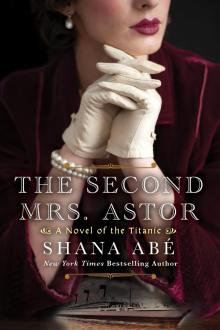 The Second Mrs. Astor
The Second Mrs. Astor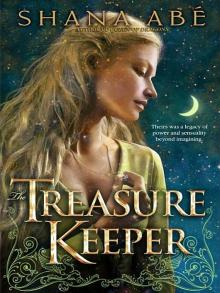 The Treasure Keeper
The Treasure Keeper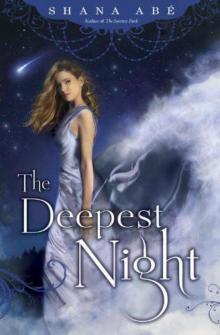 The Deepest Night
The Deepest Night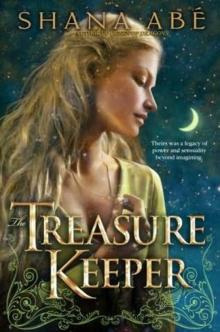 The Treasure Keeper d-4
The Treasure Keeper d-4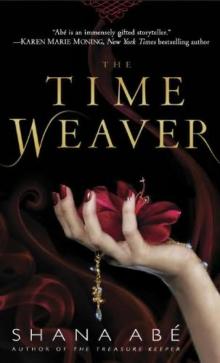 The Time Weaver d-5
The Time Weaver d-5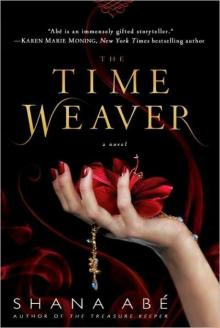 The Time Weaver
The Time Weaver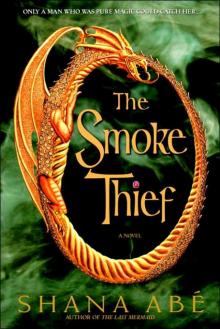 The Smoke Thief
The Smoke Thief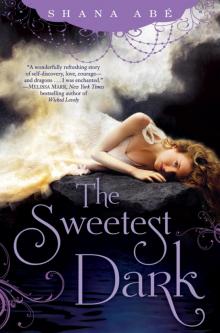 The Sweetest Dark
The Sweetest Dark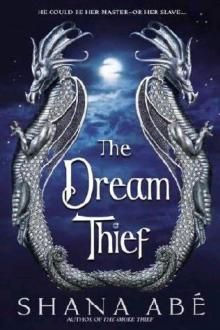 The Dream Thief
The Dream Thief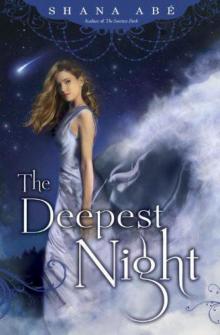 The Deepest Night tsd-2
The Deepest Night tsd-2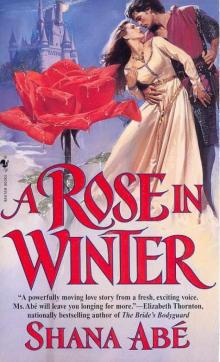 A Rose in Winter
A Rose in Winter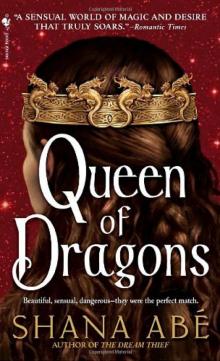 Queen of Dragons d-3
Queen of Dragons d-3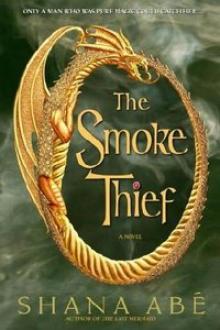 The Smoke Thief d-1
The Smoke Thief d-1